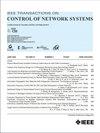Stochastic Event-Triggered Estimation With Smart Sensors Over Packet-Dropping Links
IF 5
3区 计算机科学
Q2 AUTOMATION & CONTROL SYSTEMS
引用次数: 0
Abstract
The event-triggered scheme (ETS) has been widely used for sensor data scheduling in cyber-physical systems. Existing literature on the design of ETSs for packet drops deals with the issue of non-Gaussianity of the a posteriori distribution in the system state. On the one hand, the Gaussian assumption only derives an approximate result, while on the other hand, exact results can be obtained by numerical integration but with excessive computational complexity. To this end, in this article, we propose a stochastic ETS based on acknowledgment information for remote state estimation with smart sensors and packet drops. The transmission decision is jointly driven by the holding time at the remote end and the accumulated innovative information. Then, we inductively derive the exact probability density function of the augmented innovative information vector by the Bayesian rule, which is used to obtain the explicit form of the estimation error covariance. These exact theoretical results mean that the design of scheduling parameter sequences no longer relies on experience. Finally, numerical simulations are provided to demonstrate that the empirical results agree with the theoretical results.智能传感器在丢包链路上的随机事件触发估计
事件触发方案(ETS)已广泛应用于网络物理系统中的传感器数据调度。现有文献中关于丢包的ets设计涉及系统状态后验分布的非高斯性问题。一方面,高斯假设只能得到近似的结果,另一方面,通过数值积分可以得到精确的结果,但计算量过大。为此,在本文中,我们提出了一种基于确认信息的随机ETS,用于智能传感器和丢包的远程状态估计。传输决策由远端保持时间和累积的创新信息共同驱动。然后,根据贝叶斯规则归纳出增广创新信息向量的精确概率密度函数,并利用该函数得到估计误差协方差的显式形式;这些精确的理论结果意味着调度参数序列的设计不再依赖于经验。最后,通过数值模拟验证了实验结果与理论结果的一致性。
本文章由计算机程序翻译,如有差异,请以英文原文为准。
求助全文
约1分钟内获得全文
求助全文
来源期刊

IEEE Transactions on Control of Network Systems
Mathematics-Control and Optimization
CiteScore
7.80
自引率
7.10%
发文量
169
期刊介绍:
The IEEE Transactions on Control of Network Systems is committed to the timely publication of high-impact papers at the intersection of control systems and network science. In particular, the journal addresses research on the analysis, design and implementation of networked control systems, as well as control over networks. Relevant work includes the full spectrum from basic research on control systems to the design of engineering solutions for automatic control of, and over, networks. The topics covered by this journal include: Coordinated control and estimation over networks, Control and computation over sensor networks, Control under communication constraints, Control and performance analysis issues that arise in the dynamics of networks used in application areas such as communications, computers, transportation, manufacturing, Web ranking and aggregation, social networks, biology, power systems, economics, Synchronization of activities across a controlled network, Stability analysis of controlled networks, Analysis of networks as hybrid dynamical systems.
 求助内容:
求助内容: 应助结果提醒方式:
应助结果提醒方式:


